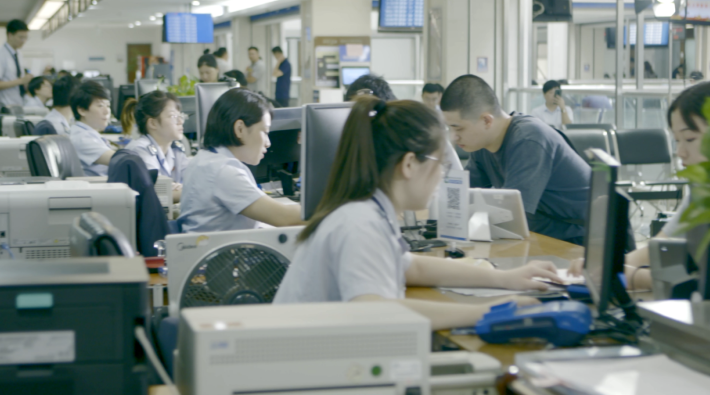At the beginning of the new year, manufacturing tax cuts and fee reductions ushered in a "New Year gift package". On January 5, Li Keqiang, member of the Standing Committee of the Political Bureau of the CPC Central Committee and Premier of the State Council, said when presiding over a symposium on tax reduction and fee reduction, large-scale tax reduction and fee reduction are key measures for macro-control. Affected by multiple factors at home and abroad, China's economy is facing new downward pressure. We must promptly implement new and stronger combined tax and fee reductions to ensure a stable start to the economy in the first quarter and stabilize the macroeconomic market.

In recent years, China has continued to reduce taxes and fees. In 2021, with the introduction of a series of precise and effective policies, enterprises, especially small and medium-sized enterprises, will move forward more briskly.
More precise tax and fee reduction
The 2021 government work report pointed out that it is necessary to continue to implement the 75% super deduction policy for corporate R&D expenses, and increase the super deduction ratio for manufacturing enterprises to 100%. Use the tax incentive mechanism to encourage enterprises to increase investment in research and development, and strive to promote enterprises to lead development through innovation. Against this background, in the past year, the tax and fee reduction policies have been continuously optimized and implemented.
At the executive meeting of the State Council held on October 27, 2021, the implementation of phased tax deferral measures for small, medium and micro enterprises in the manufacturing industry will be deployed to further increase the relief efforts of enterprises. The latest data from the State Administration of Taxation shows that after the implementation of the phased tax deferral measures, a total of 78.33 billion yuan of tax deferrals have been processed for small, medium and micro enterprises in the manufacturing industry.
In addition to the temporary tax deferred measures, the tax department also refunds the incremental value-added tax credits to advanced manufacturing enterprises in full on a monthly basis. In the first three quarters of 2021, the tax department has processed a total of 42 billion yuan in tax refunds for 11,600 advanced manufacturing enterprises.
Tao Jin, a senior researcher at Suning Financial Research Institute, said in an interview with a reporter from the International Business Daily that the above data reflects the refinement of the tax and fee reduction policy structure, "The more precise and effective fiscal policy, the investment of fiscal funds is more inclined to people's livelihood. The measures have resulted in broader and more targeted relief."
Tao Jin said that in 2021, with the introduction of a series of more rigid policies, tax and fee reductions will be more effectively implemented. At the same time, the recovering growth of fiscal revenue also provides more space for expanding the scale of tax and fee reductions. In addition, the reduction in the scale of local government infrastructure investment has also eased the constraints on tax and fee reduction funds.
Tao Jin further said that even under the influence of the new crown pneumonia epidemic, the scale of tax reduction and fee reduction in the past two years has not declined significantly, reflecting the continuity and stability of the policy, institutional and permanent, and it is able to provide long-term support for small, medium and micro enterprises. A pragmatic move to lighten the burden.
Policy will be stronger
At present, China's economic development is facing the triple pressure of demand contraction, supply shock, and weakening expectations. At the same time, under the impact of the epidemic of the century, the evolution of the century-old situation has accelerated, and the external environment has become more complex, severe and uncertain. This makes the recovery of market players such as small, medium and micro enterprises, individual industrial and commercial households, and manufacturing still require further policy support.
Li Keqiang said at the symposium that the tax and fee reduction measures to support small and micro enterprises and individual industrial and commercial households that expire at the end of 2021 should be continued. Improve the additional deduction policy for research and development expenses, increase the value-added tax refund, and promote the technological innovation and renovation of manufacturing enterprises. For industries with special difficulties, such as the service industry that has been severely affected by the epidemic and has a large employment capacity, we will study tax and fee reduction measures for targeted assistance. The state will continue to increase transfer payments to local governments, promote financial resources to sink to the grassroots level in cities and counties, and provide guarantees for tax and fee reductions.
Tao Jin bluntly said that in the context of the centralized implementation of large-scale tax and fee reduction measures, some areas have seen insufficient policy implementation and local governments put additional pressure on enterprises. To this end, he suggested that in order to ensure the effective implementation of the policy, it is necessary to increase the top-down fine supervision and punishment of local tax and fee collection.
"Although the profitability of manufacturing enterprises will improve significantly with the rapid improvement of industrial production after the epidemic, strong external demand and rising commodity prices in the middle and upper reaches, it is still necessary to see that the current state's tax cuts for manufacturing, especially high-tech manufacturing The reduction of fees needs to be strengthened." In Tao Jin's view, in the future, it is necessary to further increase the support for the downstream consumer goods manufacturing industry and the terminal consumer sector in terms of tax reduction and fee reduction.